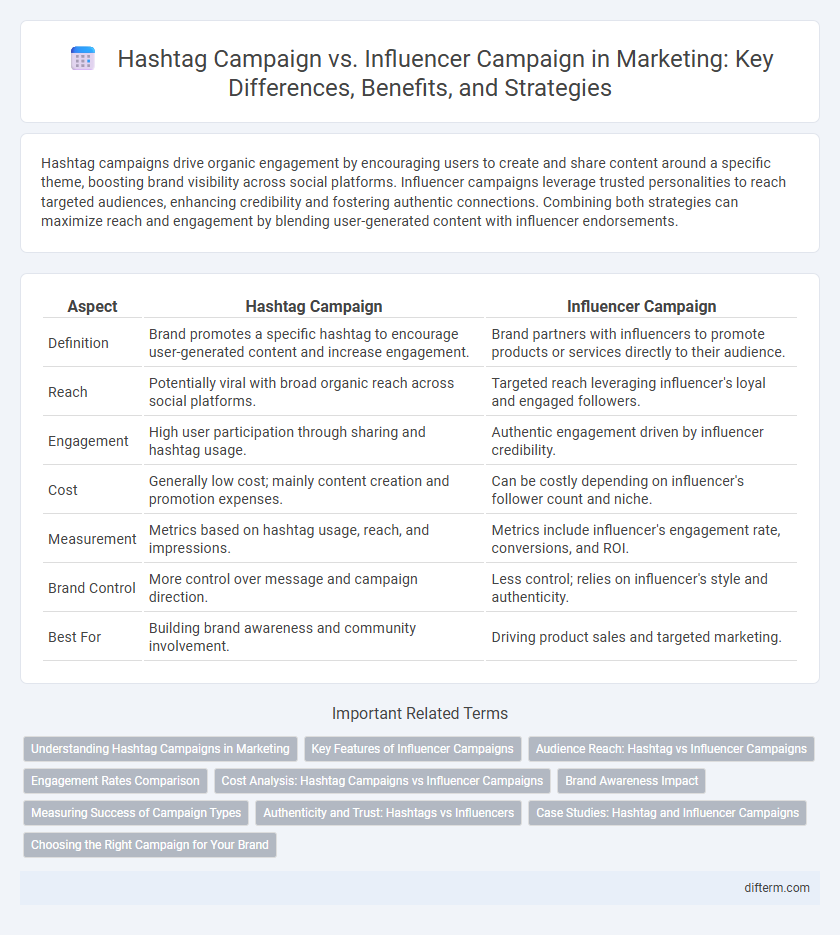Hashtag campaigns drive organic engagement by encouraging users to create and share content around a specific theme, boosting brand visibility across social platforms. Influencer campaigns leverage trusted personalities to reach targeted audiences, enhancing credibility and fostering authentic connections. Combining both strategies can maximize reach and engagement by blending user-generated content with influencer endorsements.
Table of Comparison
| Aspect | Hashtag Campaign | Influencer Campaign |
|---|---|---|
| Definition | Brand promotes a specific hashtag to encourage user-generated content and increase engagement. | Brand partners with influencers to promote products or services directly to their audience. |
| Reach | Potentially viral with broad organic reach across social platforms. | Targeted reach leveraging influencer's loyal and engaged followers. |
| Engagement | High user participation through sharing and hashtag usage. | Authentic engagement driven by influencer credibility. |
| Cost | Generally low cost; mainly content creation and promotion expenses. | Can be costly depending on influencer's follower count and niche. |
| Measurement | Metrics based on hashtag usage, reach, and impressions. | Metrics include influencer's engagement rate, conversions, and ROI. |
| Brand Control | More control over message and campaign direction. | Less control; relies on influencer's style and authenticity. |
| Best For | Building brand awareness and community involvement. | Driving product sales and targeted marketing. |
Understanding Hashtag Campaigns in Marketing
Hashtag campaigns leverage user-generated content by encouraging audiences to share posts using a specific, branded hashtag, amplifying brand visibility organically across social media platforms. They foster community engagement and track campaign performance through hashtag analytics, providing insights into reach and sentiment without heavy reliance on paid promotions. Compared to influencer campaigns, hashtag campaigns offer broader participation opportunities, enabling brands to build authentic connections directly with their audience through interactive and viral content sharing.
Key Features of Influencer Campaigns
Influencer campaigns leverage trusted personalities with established audiences to enhance brand credibility and reach targeted demographics effectively. Key features include authentic content creation, direct engagement with followers, and measurable impact through metrics like engagement rates and conversion tracking. These campaigns enable precise targeting by aligning brand messages with influencers' niche, increasing the likelihood of consumer trust and purchase decisions.
Audience Reach: Hashtag vs Influencer Campaigns
Hashtag campaigns generate extensive audience reach by encouraging user-generated content, leveraging the collective network of brand enthusiasts across social platforms like Instagram and Twitter. Influencer campaigns tap into highly targeted and engaged follower bases, delivering personalized brand messages that drive higher conversion rates within niche demographics. Brands often see broader visibility with hashtag campaigns but achieve deeper engagement and trust through influencer partnerships.
Engagement Rates Comparison
Hashtag campaigns typically generate higher organic reach and user-generated content, resulting in elevated engagement rates from a broader audience. Influencer campaigns often deliver more targeted engagement with a loyal follower base, leading to deeper interaction metrics such as comments and shares. Analyzing platform-specific data reveals influencer campaigns yield engagement rates averaging 3-5%, while hashtag campaigns vary widely between 1-4%, depending on campaign creativity and audience participation.
Cost Analysis: Hashtag Campaigns vs Influencer Campaigns
Hashtag campaigns typically offer lower costs due to user-generated content and organic reach, reducing direct marketing expenses significantly. Influencer campaigns demand higher budgets because of influencer fees, content production, and potential exclusivity agreements, but can yield targeted engagement and brand credibility. Analyzing ROI involves weighing the broad, cost-effective visibility of hashtags against the precise, higher-cost impact of influencer collaborations.
Brand Awareness Impact
Hashtag campaigns generate widespread brand visibility by encouraging user participation and organic content sharing, significantly amplifying reach across social platforms. Influencer campaigns leverage trust and credibility through targeted endorsements, driving deeper engagement and higher brand recall among specific audiences. Combining hashtag virality with influencer authenticity maximizes brand awareness impact and enhances overall marketing effectiveness.
Measuring Success of Campaign Types
Measuring the success of a hashtag campaign often involves tracking metrics like engagement rate, reach, and user-generated content volume, which indicate audience participation and brand visibility. Influencer campaigns primarily focus on influencer-specific metrics such as follower growth, conversion rates, and content authenticity to assess impact and ROI. Combining data analytics from social media platforms with consumer behavior insights enhances the accuracy of performance evaluation for both campaign types.
Authenticity and Trust: Hashtags vs Influencers
Hashtag campaigns foster community engagement by encouraging user-generated content, enhancing authenticity through diverse, real customer voices. Influencer campaigns leverage trusted personalities with loyal followings to build credibility and drive trust quickly. Combining both strategies maximizes reach while maintaining genuine connections with the target audience.
Case Studies: Hashtag and Influencer Campaigns
Case studies reveal that hashtag campaigns drive user-generated content and brand visibility at scale, with notable examples like Coca-Cola's #ShareACoke boosting engagement by over 20%. Influencer campaigns, exemplified by Daniel Wellington's collaborations, generate higher conversion rates and authentic audience trust, often outperforming traditional ads by up to 3x. Combining hashtag and influencer strategies maximizes reach and credibility, as seen in campaigns where influencers amplify hashtag use, resulting in exponential brand awareness and sales growth.
Choosing the Right Campaign for Your Brand
Selecting the right campaign depends on your brand's target audience and marketing goals; hashtag campaigns generate broad user engagement and organic reach, ideal for building community and increasing brand visibility. Influencer campaigns offer targeted authenticity and higher conversion rates by leveraging the trust and authority of niche personalities. Brands seeking scalable awareness should invest in hashtag strategies, while those aiming for precise audience connection and credibility benefit more from influencer collaborations.
hashtag campaign vs influencer campaign Infographic

 difterm.com
difterm.com